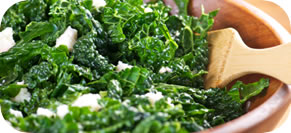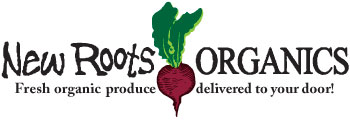Organic Recipes > Salad or Side > Lacinato Kale and Ricotta Salata Salad

Lacinato Kale and Ricotta Salata Salad (Serves 4)
courtesy of Gourmet Magazine, Epicurious
Inspired by an antipasto that's popular at New York City's Lupa, this substantial salad takes a hearty, rich green that's usually cooked and proves how delicious it can be when served raw.
I have been making this salad or variations of it for a long time never knowing where it originated. I have to say that a secret ingredient that I add, is a few splashes of White Balsamic Vinegar in addition to the lemon. It adds a touch of sweetness that really makes this salad. It is inexpensive too, and tastes great on almost any salad.
Ingredients
3/4 to 1 pound lacinato kale (also called Tuscan kale stems and center ribs discarded
2 tablespoons finely chopped shallot
1 1/2 tablespoons fresh lemon juice
zest of one small lemon
1/4 teaspoon flake salt, such as maldon
1/4 teaspoon black pepper
4 1/2 tablespoons extra-virgin olive oil
2 ounces coarsely grated ricotta salata (1 cup) (this is an inexpensive semi salty, drier, crumbly version of Ricotta)
Method
Inspired by an antipasto that's popular at New York City's Lupa, this substantial salad takes a hearty, rich green that's usually cooked and proves how delicious it can be when served raw.
I have been making this salad or variations of it for a long time never knowing where it originated. I have to say that a secret ingredient that I add, is a few splashes of White Balsamic Vinegar in addition to the lemon. It adds a touch of sweetness that really makes this salad. It is inexpensive too, and tastes great on almost any salad.
Ingredients
3/4 to 1 pound lacinato kale (also called Tuscan kale stems and center ribs discarded
2 tablespoons finely chopped shallot
1 1/2 tablespoons fresh lemon juice
zest of one small lemon
1/4 teaspoon flake salt, such as maldon
1/4 teaspoon black pepper
4 1/2 tablespoons extra-virgin olive oil
2 ounces coarsely grated ricotta salata (1 cup) (this is an inexpensive semi salty, drier, crumbly version of Ricotta)
Method
- Remove stems either with a sharp knife of by tearing the stem away by hand, which is somewhat faster
- Working in batches, cut kale crosswise into very thin slices.
- Whisk together shallot, lemon juice, salt, and pepper in a small bowl, then add oil in a slow stream, whisking until combined well.
- Toss kale and ricotta salata in a large bowl with enough dressing to coat well, then season with salt and pepper. Let sit for at least 30 minutes before eating, and toss every 10 minutes or so. The acid of the lemon will start to break down the cell walls of the kale, bringing out the flavor and making it more tender.
Why New Roots?
We can give you reasons until apples grow out of our ears. Check out our top 6 reasons for New Roots.
Site of the Week



